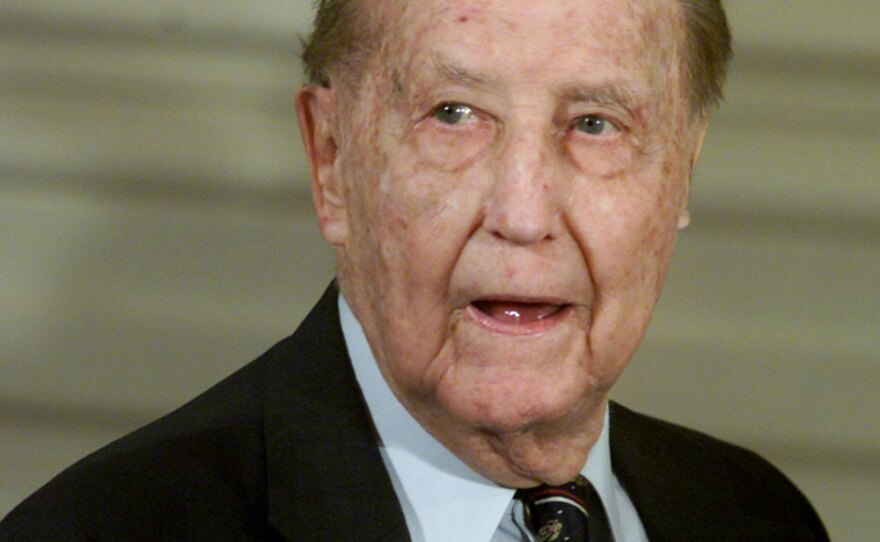There’s a virulently popular video of Poison performing at the 2009 Tony Awards. After the rock band finishes playing, the two guitarists step back upstage near the drummer. Lead singer and frontman Bret Michaels, however, lingers out front a little longer, playing to the crowd.
As he turns to leap onto the riser and join the rest of the band, a heavy backdrop lowers from the rafters and Michaels runs right into it. Boom! He is leveled flat and pinned beneath.
Just because he missed his exit cue.
Knowing when to leave is an important part of success. Michaels learned that lesson in a painful way. So, apparently, has Helen Thomas, the nearly nonagenarian White House reporter who said in an interview last month that Israel should get out of Palestine and its people should "go home" to "Poland, Germany ... and America." Video of Thomas' comments surfaced last week. A few days later, bowing to the pressure of criticism from many corners, the Hearst News Service columnist announced her retirement.
There was an immediate chorus of people who suggested that Thomas -- who before joining Hearst was a UPI correspondent for nearly 60 years -- stayed too long.
Thomas is not the first person to overstay her welcome. In just about every walk of life -- in theater, in sports, in politics -- hanging on too long can be hazardous. Some people just don’t know when to fold ‘em.
Exeunt Omnes
Botching an exit cue in a stage production can result in dramatic disaster, says Sara Freeman, a professor of theater history at the University of Oregon. Unless a show is fluid in its staging and actors are told that there can be some leeway in their various comings and goings, staying onstage when you are supposed to exit is considered “very bad etiquette or an act of outright aggression or disrespect” in the theater world, Freeman says.
“At the very least, it alters the circumstances the actors remaining onstage need to play in,” she says. And, “at the worst it ‘upstages’ them and upends planned narrative or visual effects. It distracts attention from what the focus is supposed to be in the story.”
Freeman says she has a million stories of actors who missed their entrance cues, “but missed exits are rarer because they usually have to be chosen. It’s far harder to not exit by accident.”
Going Long, Too Long
Similarly, superstar sports figures who stay in the game longer than they should can keep a team from flourishing. There are a few very famous examples: After two stints -- adding up to more than a decade -- with the Chicago Bulls, which included six NBA championships and five MVP awards, Michael Jordan retired in 1999. He was at the top of his game.

Unfortunately, Jordan returned to the NBA in 2001 to play for the Washington Wizards for two less-than-remarkable seasons.
Other superstars who perhaps should have hung it up earlier than they did include major league baseball greats Rickey Henderson and Barry Bonds, pro football legends Franco Harris and Joe Namath and history-making boxer Muhammad Ali.
NFL quarterback Brett Favre, formerly of the Green Bay Packers and now of the Minnesota Vikings, “doesn't know how or when to leave,” says USA Today sportswriter Christine Brennan, “but so far he's still winning when he comes back. He's a winning laughingstock. You don't see a lot of those.”
Professional bicyclist Lance Armstrong also has retired from, then returned to, competitive racing. Armstrong, Brennan adds, is one of those jocks who are “tempting fate.”
Past-Their-Prime Politicians
Perhaps no stage has seen more missed exit cues than the halls of Congress. Strom Thurmond (R-SC), who first came to the Senate in December 1954, shuffled through his final years in office. He served almost continuously, and to the age of 100, until leaving office in January 2003. He's the only centenarian in Senate history. (Thurmond died in June 2003, six months shy of turning 101.)

Years before Thurmond stepped down from office, there were people in South Carolina who thought he should hang up his spurs. In 1996, the Hotline political newsletter quoted Charlie Thompson, a Republican, as saying there comes a time "when even the most honored and skilled of a profession must pass the baton on to others. ... One doesn't need poll results to know South Carolina wants Strom Thurmond to retire."
There have been other examples in the Senate of people wearing out their welcome, says NPR Political Editor Ken Rudin. “Republicans, for example, were begging Delaware's William Roth to step down in 2000, so Mike Castle could run.” But Roth refused, ran one more time and lost to Democrat Tom Carper.
Sometimes, Rudin says, “you can overstay your welcome and be only in your first term ... like Gov. Jim Gibbons in Nevada. Republicans pleaded with him to drop out of the race but he insisted on running again. Fortunately for the GOP, he got creamed in Tuesday's primary.”
Of course, Rudin adds, there are those who argue that Democratic Sen. Robert Byrd of West Virginia “has long overstayed his welcome. And while he is more alert than Strom Thurmond was, it's pretty sad to watch him out there.”
Byrd, who will be 93 in November and with his 51 years in office has surpassed Thurmond as the nation’s longest-serving senator, might stay on the stage a little longer. He is up for re-election in 2012.
Copyright 2022 NPR. To see more, visit https://www.npr.org. 9(MDAzMjM2NDYzMDEyMzc1Njk5NjAxNzY3OQ001))







